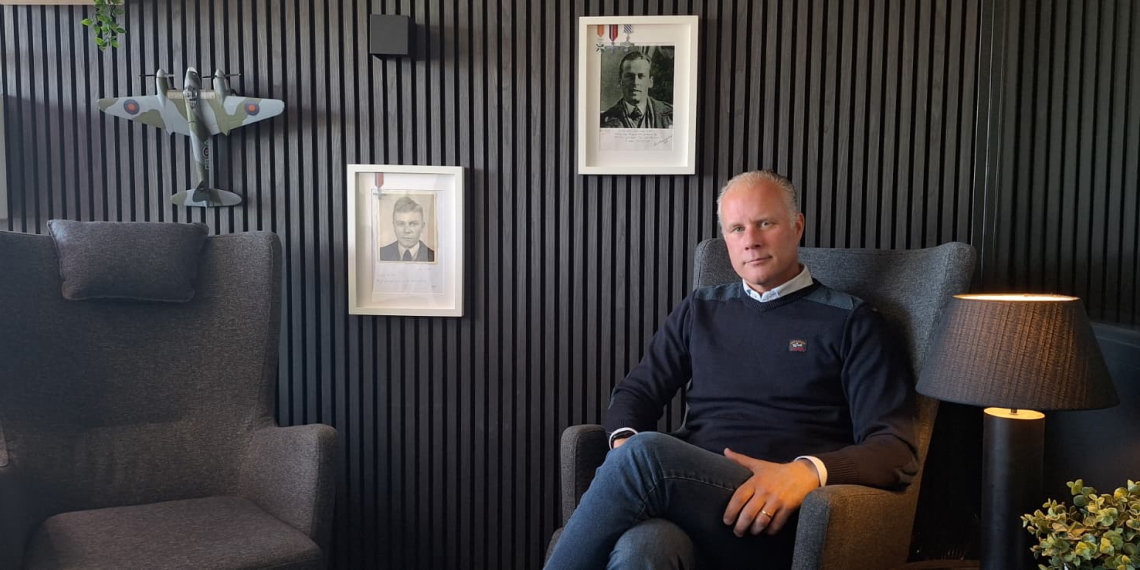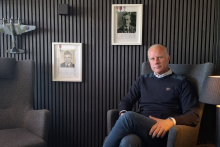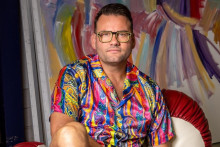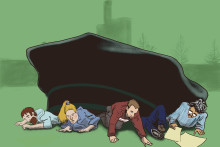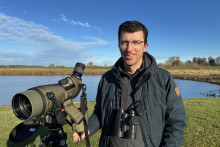The Robin Radar Systems building sits unobtrusively in a business park in Ypenburg, The Hague — at least, for now. The company has outgrown its premises and will soon relocate to Delft. Inside, there is a constant flow of employees speaking a range of languages.
The first coffee arrives from behind a counter made out of an old aircraft wing. It is brewed in a classic Boeing galley kitchen with its carefully designed compartments. The waiting area features old aircraft seats, and the route to Hamminga’s office passes a lavatory converted into a phone booth. His office is filled with Second World War memorabilia: aviator caps, Spitfire models, and, hanging above his desk, a drone. In short, the building has a clear theme: Hamminga is flying high.
Though, by his own admission, that came late. ‘At school I wasn’t very motivated, I have to admit. I often thought: what am I doing here? I would much rather have been busy with technology, building things myself.’
Patatras
Since his brother was already studying at UT, Hamminga occasionally joined parties on campus. ‘I loved that campus vibe', he recalls. He decided to enrol in Industrial Engineering and Management in Enschede, studying there from 1994 to 2001. He enjoyed student life to the full, though he remains somewhat tight-lipped about it. ‘I lived in the Patatras student house, and that meant a lot to me. I still have a Christmas dinner every year with my housemates. The house gave me the necessary social checks. If I took off somewhere while the house hadn’t yet been cleaned, the Nestor would whistle me back. And since I was busy running a business, my studies inevitably fell behind. They also pointed that out to me: 'Shouldn’t you be doing something about your study credits?' That really kept me going.’
Entrepreneur of Orange
Hamminga sits back in his chair, with two portraits looking down on him. They turn out to be resistance fighters: his grandfather Sijtsma and Erik Hazelhoff Roelfzema, perhaps the most famous Dutch resistance fighter. Roelfzema’s life story inspired the longest-running Dutch musical, Soldier of Orange. Hamminga corresponded with him regularly until Roelfzema’s death in 2007.
Does he see himself as a resistance fighter? ‘I’m more an Entrepreneur of Orange. We now work closely with defence, and that has always appealed to me. I was in the cohort when compulsory military service was abolished, but I seriously considered joining the commandos or the marines. After the medical, I got a letter saying I definitely didn’t have to serve.’
Self-confidence is not something he lacks. In 2001 he heard about plans for a second Soldier of Orange film. ‘I immediately applied for the lead role. I had done some amateur theatre at school and during my student days. Becoming an actor was something I had thought about, but my parents always saw it as a hobby. I was brought up with the belief that it wasn’t 'real work'. But nothing ventured, nothing gained.’ His rejection was a clear signal: he should focus on entrepreneurship.
‘My entire company was literally one clothing rack wide’
Hamminga grew up with entrepreneurship at the kitchen table. ‘My father was an entrepreneur too, he had a machine factory. So it was no surprise that during my student years I started my first business. At the time, UT was branding itself as the entrepreneurial university. I took over a small company from a housemate, selling suits and tuxedos to students. My entire company was literally one metre sixty wide — the width of a clothing rack.’
Rector in his underwear
With clever marketing he even managed to sell a suit to Frans van Vught, UT’s then rector magnificus. ‘He always spoke highly of entrepreneurship at UT. So I had exactly three posters printed, offering a special discount to rectors of entrepreneurial universities. I put one up in the board wing, gave one to his secretary, and one to his chauffeur. Not long after, he was standing in my student room in his underwear trying on a suit.’
His studies also took him to Silicon Valley, the place to be at the time. ‘This was before the internet bubble burst. Nothing was too crazy there. I went to study business models, to see how they set up tech companies and whether we could do the same here.’ He mostly discovered how many ideas were not viable.
Still, the sense of unlimited possibilities stayed with him, as did a resolution not to follow the path of certain entrepreneurs he once admired. ‘I saw that many highly successful entrepreneurs never had enough, always wanting more. And they often failed to combine business success with a harmonious family life. I resolved to do things differently, and if that costs a few zeros, so be it.’
Instinct
He then threw himself into his company Waleli, which developed the first mobile-phone doorbell. ‘Far too early. The world wasn’t ready. There were no smartphones, no Wi-Fi routers, and hardly any parcel deliveries at the door. Years of testing and development went into it. It wasn’t a total flop, there were a few hundred households using it at the peak.’ Today, smart doorbells are everywhere, though produced by Amazon. Other ideas, like smart meters and mapping free parking spaces, were also ahead of their time. Does that sting? ‘I mostly learned to trust my instinct. A good idea is a good idea, but timing is everything.’
Robin takes flight
Another opportunity came in the form of Radar Observation of Bird INtensity (ROBIN). TNO, the Dutch applied science organisation, asked Hamminga to help think about the future of a radar system that could detect flocks of birds, warning the air force of risks in the skies. ‘It turned out to be a serious issue. Since the 1950s the Dutch air force had lost around twelve aircraft to bird strikes.’
Rather than writing an advisory report, Hamminga decided to buy the intellectual property rights. In 2010 he founded Robin Radar Systems.
Winning over Schiphol Airport, his prime target, was difficult. ‘TNO had been talking to Schiphol about the technology for years, but they were reluctant. Once you see the birds, you have to act. I basically started Robin Radar three-nil down, because without Schiphol as a reference, it was going to be a tough match.’
A stroke of luck changed everything. In June 2010, only weeks after Robin Radar Systems was founded, a Royal Air Maroc flight took off from Schiphol and sucked geese into an engine. The plane made a smoking emergency landing. Nobody was injured, but politics and Schiphol were in uproar. Questions were asked in Parliament. ‘The next day I read in the paper that they would be installing bird radars.’
Garden goose
To celebrate, Hamminga bought a €7 concrete garden goose, which he unveiled as the Monument to Fallen Geese. It still stands in the office today. ‘Humour is important.’

From there, development accelerated. Initially the system could only detect where a flock was, not its altitude. Tracking individual birds took more work. Testing was done with drones, which increasingly became a safety concern themselves. Then Russia invaded Ukraine in 2022, ushering in the first drone war. Conventional radar cannot detect drones — but Robin’s technology can.
Thanks to micro-Doppler technology, the radars can now distinguish between a drone and a bird. ‘In essence, we can see whether something has wings or propellers.’
Scaling up
The company now has more than 200 employees of 35 nationalities. Since 2023 it has received millions in defence orders, scaling production from dozens a year to six a week. The technology also applies to wind farms, where bird casualties are an issue.
The US branch is thriving too, with sales to the Department of Homeland Security. ‘On Christmas Eve 2024 I suddenly got a call from an American journalist telling me that a senator had mentioned us in connection with drone sightings over New Jersey. Soon after, I was on national television as an 'expert'.’

From losses to growth
Not all was smooth sailing. ‘In Robin’s early years, we attracted investors who believed in the story. But in 2013, we posted a million-euro loss. That’s not the kind of news you want to share with shareholders. In 2014 and 2015 we were still in the red. I doubted myself enormously. I even called an extraordinary shareholder meeting with a single agenda point: Am I still the right person to lead Robin? They still had confidence. The next year things took off.’
Does he have qualms about working in defence? ‘No. At heart I am a pacifist — as, I think, are most people in defence. They know better than anyone how devastating war is and that it only produces losers. In an ideal world everyone would lay down their arms and live in peace. But that is not reality, so I believe a strong defence is necessary. I am proud that our company contributes to Europe’s security.’
Churchill
What message does he want to give to students? He smiles. ‘Last year UT gave me the Van den Kroonenberg Award as a successful entrepreneur. But honestly, during my studies I was no high-flyer. I barely scraped passes, I had no motivation for textbooks. That award felt contradictory. So my message to students is: you don’t have to be a model student to be successful. The real game only starts after you graduate. The strength of a successful entrepreneur is being able to handle setbacks. In my man cave at home I have a quote from Winston Churchill, another inspiration for me: 'Success is going from failure to failure without losing enthusiasm.'’
He pauses for a moment. ‘I wouldn’t have wanted to miss it. But sometimes I wonder whether I should have just started out as an entrepreneur straight away.’
Hamminga will speak on 3 October at the Alumni Talks in the Vrijhof.


